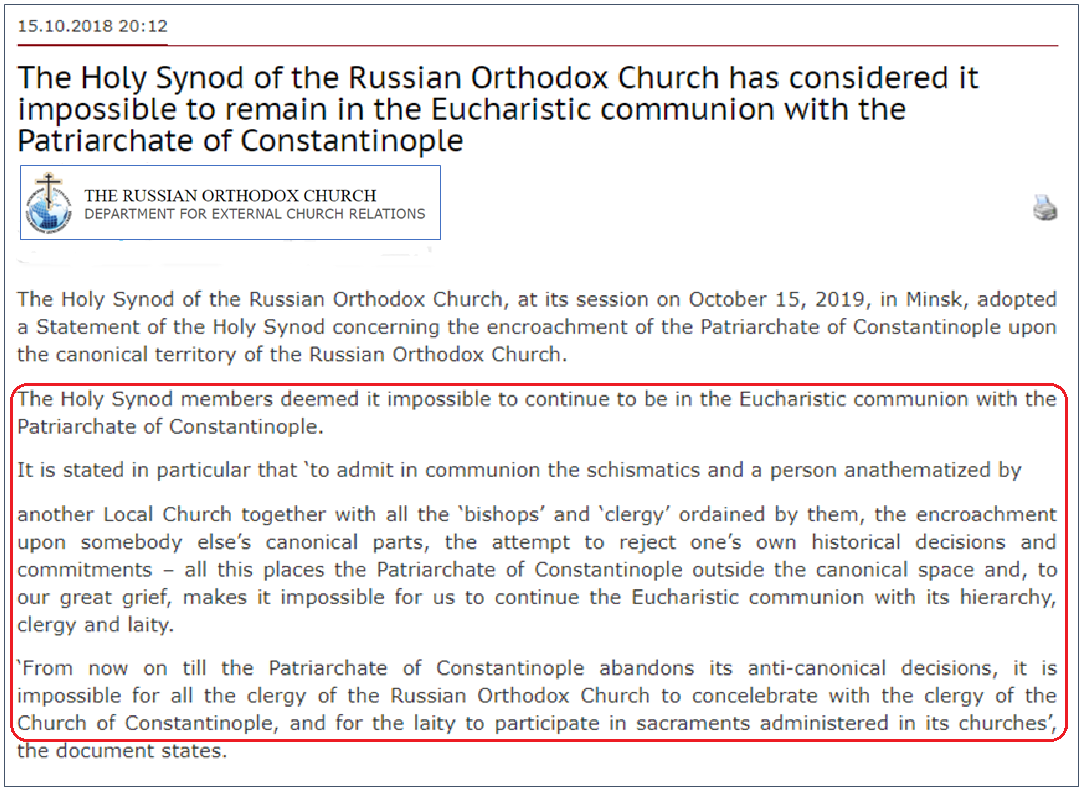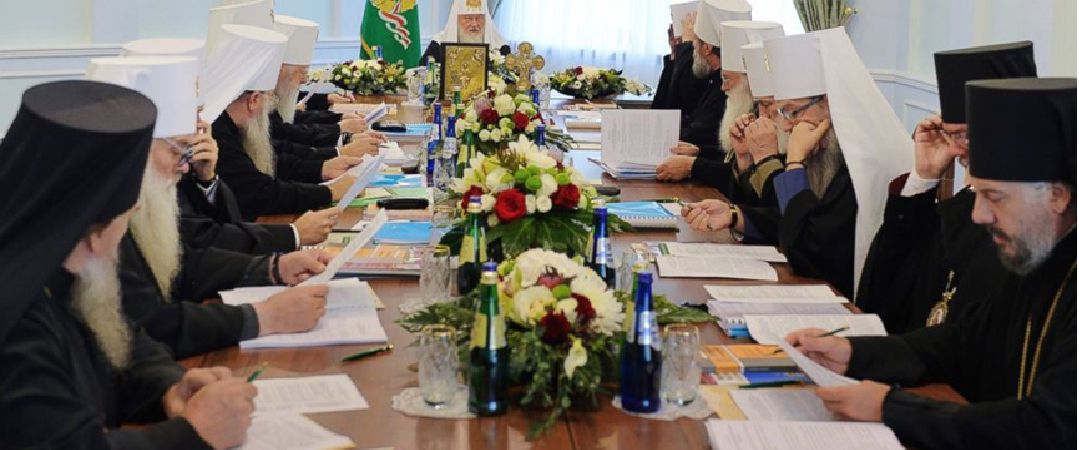A schism in the Orthodox world???

 Patriarch Kirill presides at Holy Synod on October 15, 2018 which voted to break with the Ecumenical Patriarch of Constantinople.
Unfortunately, CNA was quite deficient and/or simply lazy in backgrounding this story and does not really tell us the implications of the Russian Orthodox Church's 'break' with
Patriarch Kirill presides at Holy Synod on October 15, 2018 which voted to break with the Ecumenical Patriarch of Constantinople.
Unfortunately, CNA was quite deficient and/or simply lazy in backgrounding this story and does not really tell us the implications of the Russian Orthodox Church's 'break' with
Ecumenical Patriarch Bartholomew of Constantinople.
In the Orthodox Churches, the Ecumenical Patriarch is considered 'primus inter pares' - first among equals - just as historically and canonically, the Orthodox Church of Constantinople
is considered 'first among equals' among all the Orthodox Churches because it was the original Church that broke away from Rome (the Western Church) in 1054 and therefore is the
core of Orthodox Christianity which resulted from that schism.
Today, there are 15 Orthodox Churches and each of them is considered autonomous and autocephalous - autonomous because they have no other allegiance except to themselves,
and auto-cephalous because they are each self-governing. (In addition, there are 9 Churches that are autonomous but not recognized by all of the autocephalous church as
autonomous). Moscow therefore had a perfect right to break with Bartholomew in his capacity as Pariarch of Constantinople, which does not affect either the Patriarchate of Moscow
nor the Patriarchate of Constantinople insofar as they are autonomous and autocephalous churches.
- But does it mean then that Moscow can now ignore whatever the Ecumenical Patriarch says about the Orthodox Churches in general, even if the other Orthodox Churches give
their explicit assent to what he says in their name?
- What will the other Orthodox Churches do about the situation? Will they take sides between Moscow and Constantinople, and if so, what would it mean for Orthodox unity?
- What mechanism do the Orthodox Churches have, as a whole, to promulgate or ratify any measure that will effectively define their ecclesial reality today?
Moscow has virtually always contested the internal primacy of Constantinople in the Orthodox world and considers itself, not Contantinople, as the 'second Rome'. The Ukraine
issue could possibly be the pretext they were waiting for to cement their claim into reality - because after all, Moscow already accounts for ___ of the world's Orthodox population.
(Constantinople which has been under the Turks for the past six centuries only has a tiny token Orthodox population.)
Whether the other Orthodox Churches unanimously approve or reject Bartholomew's move on the Ukrainian Church would have to be decided by a synodal vote of each of
the Churches.
- Assuming there is unanimity, one way or the other, how do they go about putting it into practice without 'isolating' either Constantinople or Moscow from the worldwide Orthodox
community?
- Does Moscow really care what the other Orthodox Churches think? It is so overwhelmingly powerful compared to any of the others that it can simply go ahead and do what it wants.
- What does this mean for the attempts for a Catholic-Orthodox dialog (begun in 2007) aiming first of all to resolve the issue of papal primacy which the Orthodox dispute,
as a first step towards greater de facto ecumenism between the Western and Eastern churches?
Russian Orthodox Church splits from Constantinople to protest
recognition of an independent Ukrainian Orthodox Church

October 16, 2018
The Russian Orthodox Patriarchate of Moscow has cut ties with the Ecumenical Patriarch of Constantinople, Bartholomew I, claiming his recognition of an independent Orthodox Church in Ukraine departed from Orthodox Christian norms.
Metropolitan Hilarion, who heads foreign relations for the Russian Orthodox Church, said Russian Orthodox leaders decided to “break the Eucharistic communion” in response to actions it called “lawless and canonically void.”
“The Russian Orthodox Church doesn’t recognize those decisions and won’t fulfill them,” Hilarion said in Belarus after a meeting of the synod of the Russian Orthodox Church.
“The church that acknowledged the schismatics has excluded itself from the canonical field of Orthodoxy.”
“We are hoping common sense will prevail and that the Constantinople Patriarchate will change its relations to existing church reality,” Metropolitan Hilarion said.
The break comes in response to the decision of Bartholomew I, Ecumenical Patriarch of Constantinople and the “first among equals” leader of the global Orthodox Church, to issue a statement Oct. 11 confirming plans for an independent Ukrainian Orthodox Church and restoring ties with the previously schismatic Ukrainian Orthodox Church of the Kyivan Patriarchate.
The announcement also removed the traditional right of the Russian Patriarch to ordain the Metropolitan of Kyiv, a move which observers predicted would be perceived as a deliberate slight to Moscow. The right dated back to a canonical letter first issued in the year 1686.
Archbishop Yevstratiy, chief spokesman for the Ukrainian Orthodox Church of the Kyivan Patriarchate and whose rehabilitation by Constantinople contributed to the current break with Moscow, said the Russian synod’s decision was a move towards “self-isolation.”
Writing in a Facebook post, he said “Sooner or later this will be fixed and the Russian Orthodox Church will return to communion.”
According to the U.S. government-funded Radio Free Europe/Radio Liberty Press Service, Yevstratiy claimed that Orthodox Christians must choose whether to follow the Russian Orthodox “into schism” or “remain in unity with the Ecumenical Patriarch (Bartholomew I of Constantinople) through the Local Ukrainian Church.”
Among the backers of Constantinople’s move are Ukrainian President Petro Poroshenko, who is running for re-election in March 2019. He had previously asked the Patriarch of Constantinople to grant independence to the Orthodox Church in Ukraine, the Associated Press reports.
While the recent push for an independent, autocephalous Orthodox Church in Ukraine emerged as a serious movement in the 1990s following the collapse of the Soviet Union, it gained further momentum following the annexation of the Crimean Peninsula in 2014, and Russian backing of separatist rebels in eastern Ukraine in response to the unseating of Ukraine’s pro-Russia former president Viktor Yanukovych.
The Russian Orthodox Church, which claims traditional and canonical authority over the Orthodox community in Ukraine, has denied taking political sides in the conflict and said it has worked for peace in eastern Ukraine.
The Russian Church has also voiced concern that the Constantinople patriarchate’s actions could deepen religious divides in Ukraine and inspire breakaway branches to take over church buildings, Reuters reports.
Kyiv, now the capital of Ukraine, is the site of the 988 baptism of Vladimir the Great, Grand Prince of Kiev, which resulted in the Christianization of Kyivan Rus’, a state whose heritage Ukraine, Russia, and Belarus all claim.
Orthodox Christians in Ukraine have recently been divided into three separate groups.
The Ukrainian Orthodox Church of the Kyivan Patriarchate effectively declared itself independent from Moscow in 1992, and is considered by the Russian Church to be a schismatic group. Until now, the other Orthodox Churches have recognized Ukraine as under Moscow’s jurisdiction and honored the excommunication.
The Ukrainian Autocephalous Orthodox Church, re-founded in 1990, is similarly seen as a breakaway group.
The Ukrainian Orthodox Church of the Moscow Patriarchate is under the authority of the Russian Church and has been the officially recognized Orthodox Church in the country.
Patriarch Bartholomew’s plan to create a single, self-governing Church in the Ukraine, led by its own patriarch, is motivated by a desire to unify the country’s 30 million Orthodox Christians. The Russian Church sees the move as an infringement of its jurisdiction and authority.
There are about 300 million Orthodox Christians worldwide. The Orthodox Church split from the Catholic Church in 1054.
Fortunately, there is more explicit information from the Moscow Patriarchate itself, which says that it no longer consiers itself in communion with Bartholomew and the Patriarchate of Constantinople, along with the Ukrainian Orthodox Church it has recognized. At least one autocephalous Orthodox Church, that of Serbia, has publicly sided with Moscow on this question:
Metropolitan Hilarion says Constantinople
has lost the right to be called
the coordinating center for the Orthodox Church

October 16, 2018
‘The way to returning from a schism is always open and this way lies through repentance’, said Metropolitan Hilarion of Volokolamsk, head of the Moscow Patriarchate department for external church relation, speaking in the Big Game analytical TV program about ways of coming out of the situation caused by the anti-canonical actions of the Patriarchate of Constantinople because of which the Holy Synod of the Russian Orthodox Church, on October 15, 2018, had to recognize as impossible to remain any further in the Eucharistic communion with it.
As is known, b
y its decisions of October 11, the Patriarchate of Constantinople ‘revoked’ the decision made over 300 years ago to transfer the Metropolis of Kiev to the jurisdiction of the Moscow Patriarchate, thus encroaching upon the canonical territory of the Russian Orthodox Church and stated its readiness to implement the project for ‘Ukrainian autocephaly’.
In addition, the Synod of the Patriarchate of Constantinople in defiance of canonical order admitted into communion the leaders of the Ukrainian schism.
‘The Patriarchate of Constantinople has joined the purely political project, which has existed already for over a quarter of a century, to create the so-called autocephalous Ukrainian church’, the DECR chairman reminded the audience, ‘the project was initiated and supported by political leaders but it is not supported by the basic mass of the church people in Ukraine. It is evident from the thousands-strong processions with the cross held in Kiev; it is evident from the overcrowded churches of the canonical Ukrainian Orthodox Church. And we regret that the Patriarchate of Constantinople, for its selfish reasons, has embarked on the path of support for the schism – this anti-church political project’.
It is not the first case of this kind in history, Metropolitan Hilarion stated with regret: ‘we remember how Constantinople used to support the Renovators’ schism and delivered blows on the Russian Orthodox Church every time when she found herself in a hard situation’, the archpastor noted, ‘Here is the price of fraternal love so often assured by the Patriarchate of Constantinople’.
‘We have now come to face a new church reality: we no longer have a single coordinating center in the Orthodox Church, and we should very clearly realize that the Patriarchate of Constantinople has self-destructed as such’, Metropolitan Hilarion stressed.
He reminded the audience that for several decades the Moscow Patriarchate and other Local Churches participated in preparing a pan-Orthodox Council; their representatives and Primates would get together for meetings, which were organized by the Patriarchate of Constantinople.
‘But having invaded the canonical boundaries of another Local Church, by legitimatizing a schism it has lost the right to be called the coordinating center for the Orthodox Church’, the hierarch said.
Is there a possibility that the Patriarchate of Constantinople will disavow the steps it has made?
‘A possibility for repentance is always there, though the logic of the recent actions do not presuppose any steps in the opposite direction’, His Eminence assumed, ‘but we still very much hope that reason will prevail.
Patriarch Bartholomew has been often called ‘the spiritual leader of the 300 million-strong Orthodox population of the planet’, but from these 300 million at least a half should be subtracted; for he is not the spiritual leader for either the Russian Orthodox Church or the Local Orthodox Churches, which I think will not support his predatory actions. Precisely for this reason I say that he has now lost the right to be called the coordinating center for the Orthodox Church’.
The Moscow Patriarchate will continue communion with other Local Orthodox Churches, the DECR chairman said, ‘we will continue visiting each other, coordinating our efforts, our views, but the Patriarchate of Constantinople has now fallen out of this process and we should very clearly realize it’.
[Modificato da TERESA BENEDETTA 17/10/2018 00:11]